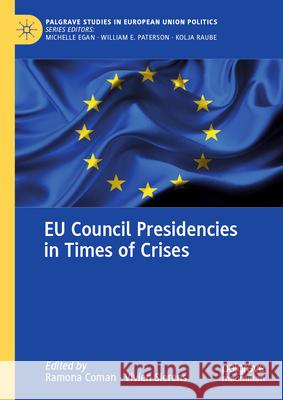Eu Council Presidencies in Times of Crises » książka



Eu Council Presidencies in Times of Crises
ISBN-13: 9783031447877 / Angielski
Eu Council Presidencies in Times of Crises
ISBN-13: 9783031447877 / Angielski
(netto: 498,38 VAT: 5%)
Najniższa cena z 30 dni: 462,63
ok. 22 dni roboczych.
Darmowa dostawa!
1. Introduction: Ramona Coman, Olivier Costa and Vivien Sierens
Ramona Coman is Professor in Political Science at the Université libre de Bruxelles, member of the CEVIPOL and Emeritus President of the Institut d’études européennes, Belgium.
Olivier Costa is Research Professor at the CNRS, CEVIPOF, Sciences Po (Paris), France. He is also Director of European Political and Governance Studies at the College of Europe (Bruges), Belgium.
Vivien Sierens is a Belgian diplomat. Holder of a PhD in political and social sciences (ULB & VUB), he is also an associate researcher at the Université libre de Bruxelles (CEVIPOL), Belgium.
“The authors demonstrate that the Council of the European Union, though imperfect and undoubtedly impervious to reform, manages to strike a balance between national interests and the need for supranational action.”
-Jean-Paul Jacqué, Honorary Director General, Council of the EU, Emeritus Professor of EU Law at the University of Strasbourg, France
“EU Council Presidencies in Times of Crises is a highly topical and welcome publication and merits the attention of all those who want to understand the EU.”
-Jim Cloos, TEPSA Secretary-General, Former Senior EU Civil Servant
“EU Council Presidencies in Times of Crisis is required reading for anyone interested in European institutions.”
-Sabine Saurugger, Professor of Political Science, Director of Sciences Po Grenoble, France
The Council of the EU is a powerful institution whose centrality has been challenged by the Treaty of Lisbon. More than ten years after this major institutional revision, this book examines its role within the EU political regime and its interactions with other institutions. It explores how the Council Presidency has navigated major crises over the past decade and addressed internal challenges. The various chapters discuss key timely questions: How has the relationship between the Council and the European Council evolved over time? To what extent have the recent crises reshaped the relationship between the Council and the European Parliament, as well as its interactions with the Commission? Is the Council Presidency still a powerful mediator? What are its internal challenges? What are the prospects for the rotating presidency system?
Ramona Coman is Professor in Political Science at the Université libre de Bruxelles, member of the CEVIPOL and Emeritus President of the Institut d’études européennes, Belgium.
Olivier Costa is Research Professor at the CNRS, CEVIPOF, Sciences Po (Paris), France. He is also Director of European Political and Governance Studies at the College of Europe (Bruges), Belgium.
Vivien Sierens is a Belgian diplomat. Holder of a PhD in political and social sciences (ULB & VUB), he is also an associate researcher at the Université libre de Bruxelles (CEVIPOL), Belgium.
1997-2026 DolnySlask.com Agencja Internetowa
KrainaKsiazek.PL - Księgarnia Internetowa









